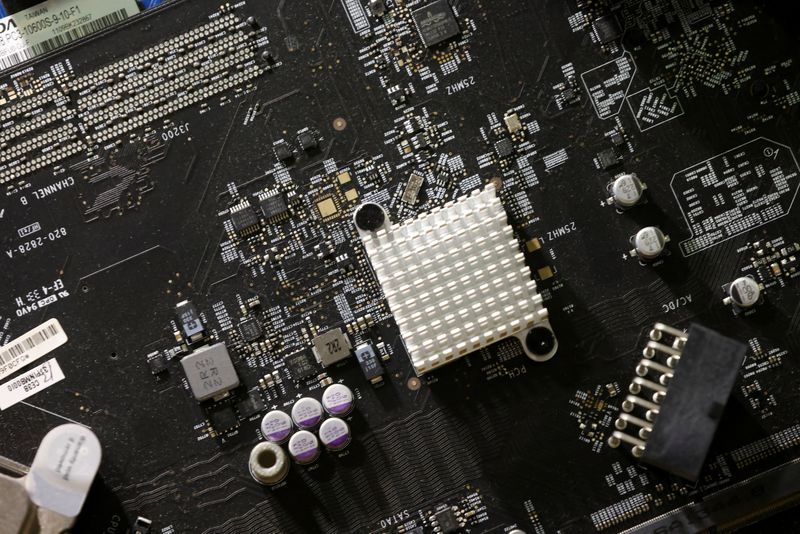By Alexandra Alper and Karen Freifeld
WASHINGTON (Reuters) - The White House is warning the chip industry to diversify its supply chain in case Russia retaliates against threatened U.S. export curbs by blocking access to key materials, people familiar with the matter said.
The potential for retaliation has garnered more attention in recent days after Techcet, a market research group, published a report on Feb. 1 highlighting the reliance of many semiconductor manufacturers on Russian and Ukrainian-sourced materials like neon, palladium and others.
According to Techcet estimates, over 90% of U.S. semiconductor-grade neon supplies come from Ukraine, while 35% of U.S. palladium is sourced from Russia.
Peter Harrell, who sits of the White House's National Security Council, and his staff have been in touch with members of the chip industry in recent days, learning about their exposure to Russian and Ukrainian chipmaking materials and urging them to find alternative sources, the people said.
The White House declined to comment on the specifics of the conversations, but a senior official reiterated that the administration was prepared if Russia invaded Ukraine.
"Part of that is working with companies to make sure that if Russia takes actions that interfere with supply chains, companies are prepared for disruptions," the person said.
"We understand that other sources of key products are available and stand ready to work with our companies to help them identify and diversify their supplies."
Joe Pasetti, vice president of global public policy at the chip and electronics manufacturing suppliers group SEMI, sent an email to members this week gauging exposure to the vital chipmaking supplies, according to a copy obtained by Reuters.
"As discussed on today's call, please see the attached document ... regarding Russian/Ukrainian production of a number of semiconductor materials," he wrote, referencing a summary by Techcet on C4F6, Palladium, Helium, Neon and Scandium from the troubled region. "Please let me know if potential supply disruptions to any of them are a concern for your company."
Neon, critical for the lasers used to make chips, is a biproduct of Russian steel manufacturing, according to Techcet. It is then purified in Ukraine. Palladium is used in sensors and memory, among other applications.
The Biden administration has threatened to impose sweeping export controls against Russia if it invades Ukraine. Russia, which has massed over 100,000 troops along Ukraine's border, denies it plans to attack.
Some chipmakers have been reviewing their supply chains to scan for potential fallout from conflict in Ukraine. One person at a chipmaking company who declined to be named acknowledged that it has been looking into its supply of neon and other gases, some of which originate in Ukraine.
"Even if there was a conflict in Ukraine it wouldn't cut off supply. It would drive prices up," the person said. "The market would constrict. Those gases would become pretty scarce. But it wouldn’t stop semiconductor manufacturing," he added.
According to one power chip design startup executive, unrest in Ukraine has caused rare gas prices to increase and could cause supply issues. Fluorine is another gas that has a large supply from that part of the world and could be affected, the executive added.
William Moss, a spokesperson for Intel Corp (NASDAQ:INTC), said the chipmaker was not anticipating any impact to neon supply.

But the issue is still concerning, because global chip supplies are tight and chip orders are only expected to pick up. Techcet estimates demand for all the materials will rise by more than 37% over the next 4 years, pointing to recent announcements by Intel, Samsung (KS:005930), and Taiwan's TSMC in Ohio, Arizona and Texas.
Neon prices rose 600% in the runup to Russia's 2014 annexation of the Crimean peninsula from Ukraine, since chip firms relied on a few Ukrainian companies, according to the U.S. International Trade Commission.